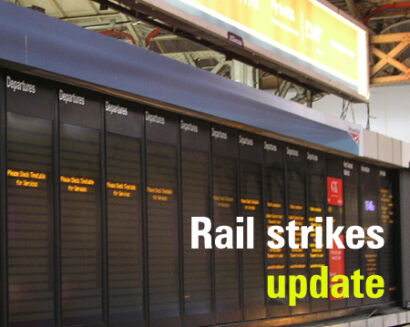Train services run by English nationalised operators and those with a Department for Transport contract are set to be disrupted for a week from 30 January, as the pay dispute between ASLEF and the operators continues.
Its members will strike at Southeastern, Govia Thameslink Railway and South Western Railway (including Island Line) on 30 January, at Northern and TransPennine Express on 31 January, at Greater Anglia, c2c and LNER on 2 February, at West Midlands Trains, Avanti West Coast and East Midlands Railway on 3 February and at Great Western, CrossCountry and Chiltern on 5 February. There will also be a continuous ban on working non-contractual overtime at all these operators from 29 January until 5 February.
Although the main effects will be felt in England, some cross-border services to Scotland and Wales will also be disrupted, although the domestic operators in those countries are not included.
ASLEF general secretary Mick Whelan said: ‘We have given the government every opportunity to come to the table but it has now been a year since we had any contact from the Department for Transport. It's clear they do not want to resolve this dispute.
‘Many of our members have now not had a single penny increase to their pay in half a decade, during which inflation soared and with it the cost of living. Train drivers didn't even ask for an increase during the Covid-19 pandemic when they worked throughout as keyworkers, risking their lives to allow NHS and other workers to travel.
‘The government has now tried their old trick of changing the rules when they can't win and brought in Minimum Service Levels legislation. But this new law, as we told officials during the consultation period, won't ease industrial strife. It will likely just make it worse.
’There's no excuse. The government and train operating companies must come to the table with a realistic offer so we can end this dispute and work together to ensure the future of our railways.’
The Department for Transport accused ASLEF of refusing to put ‘a fair and reasonable offer’ to its members, adding: ‘The ASLEF leadership should do the right thing and let their members decide their own future, instead of deciding it for them.’
The Rail Delivery Group was also critical, saying: ‘Despite the railway's huge financial challenge, drivers have been made an offer which would take base salaries to nearly £65,000 for a four day week without overtime - that is well above the national average and significantly more than many of our passengers that have no option to work from home are paid. Instead of staging more damaging industrial action, we call on the ASLEF leadership to work with us to resolve this dispute and deliver a fair deal which both rewards our people, and makes the changes needed to make services more reliable.’


